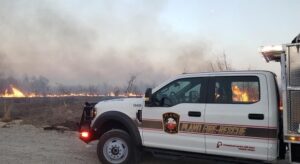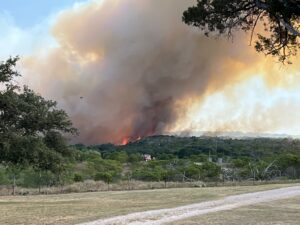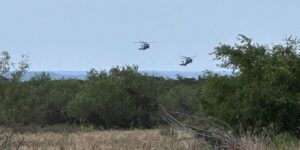An HSC executive serves near the frontlines of Texas fires
- July 21, 2023
- By: Eric Griffey
- Our People
 Last year, an open trash container whose contents ignited sparked a fire that destroyed five homes and charred more than 1,800 acres in Palo Pinto County.
Last year, an open trash container whose contents ignited sparked a fire that destroyed five homes and charred more than 1,800 acres in Palo Pinto County.
This year, the same area 80 miles west of Fort Worth that houses Possum Kingdom Lake was once again engulfed in flames. The so-called “Storage Fire,” which reportedly started behind a storage unit near TX-16 in Strawn, burned more than 1,000 acres. Officials said the blaze was manmade, just as it was the previous year.
It doesn’t take much to start a fire in times of extreme drought and low humidity, said Jessica Rangel, The University of North Texas Health Science Center at Fort Worth’s executive vice president of health systems. Rangel was near the fire’s frontlines serving as part of the medical team of Possum Kingdom Lake volunteer fire department and the state.
“It can be something as simple as leaving a glass near a trash that can act as a magnifying glass under extreme sun, and it starts fire,” she said. “The lakes are low and the grass that typically is underneath the water dries out rapidly. Traditionally, a fire that would be on one side of the lake would not cross. Now it crosses easily because you have a lot of dead vegetation to fuel it.”
During her three days serving in Palo Pinto, Rangel said she treated countless firefighters who suffered from heat exhaustion or just needed time away from the extreme conditions. She and three other providers administered fluids, served electrolyte-rich pickle juice, applied basic first aid, and more.
The Lake Palo Pinto fire department is composed of volunteers, so departments as far away as Frisco and Plano answered the call for help.
“We’re trying to prevent heat exhaustion and stabilize in the field so that after a period of time, they can return to fight the fires,” she said. “The firefighters are carrying an additional 45 pounds on their backs, which impacts their ability to be heat tolerant.”
 As DC-10 airplanes and Blackhawk helicopters bombed the flames with water and doused residential areas as a retardant, Rangel and her team triaged in a donated school bus dubbed, “the rehab bus.” Inside, the crew stored ice, protein-heavy foods, electrolyte fluids for resuscitation, fans, cooling chairs and cooling blankets,
As DC-10 airplanes and Blackhawk helicopters bombed the flames with water and doused residential areas as a retardant, Rangel and her team triaged in a donated school bus dubbed, “the rehab bus.” Inside, the crew stored ice, protein-heavy foods, electrolyte fluids for resuscitation, fans, cooling chairs and cooling blankets,
One of her biggest challenges in providing care, she said, was pushing back against firefighters who wanted to return to duty before they’d recovered enough. Since the symptoms of heat exhaustion can vary from person to person, many people suffering think they are well enough to carry on.
“Many individuals are so beautifully passionate about their role that they want to refresh and charge back out there and fight the fire,” Rangel said. “Sometimes they really need to rest and rehydrate more. That’s an opportunity for us to educate them about heat exhaustion.”
Last year, Rangel led a group of HSC students to help treat the firefighters. She said that students were ready to serve again this year, but the fire was mostly under control by the time she arrived.
In addition to heat exhaustion, Rangel said, firefighters working in a heavily wooded area also have to worry about dangerous animals fleeing the fire.
“Aside from heat, they’ve got to watch out for the snakes,” she said. “They have to worry about the other critters that are getting away.
Scenes like the ones in Possum Kingdom have repeated all over the country, as extreme weather suddenly seems to be happening everywhere at once.
 Communities in North Texas have battled triple-digit temperatures and drought conditions in recent weeks, resulting in weather ripe for grass fires, according to the National Weather Service in Fort Worth.
Communities in North Texas have battled triple-digit temperatures and drought conditions in recent weeks, resulting in weather ripe for grass fires, according to the National Weather Service in Fort Worth.
A fast-moving grass fire recently swept through a suburban neighborhood near Dallas, destroying or damaging at least 20 homes, displacing about 20 people and forcing evacuations, as firefighters struggled to fight back flames in 103-degree heat, the authorities said.
Experts do not see much prospect for improvement, as another hot and dry summer is forecast. Rather, they expect conditions to worsen.
For Rangel, the state’s tinderbox landscape means she must stay ready. That means watching her diet, exercise and sleep routines. Practicing self-care is crucial to saving lives.
“We’re at standby trying to intervene before we get to the stage where the person might have to go to the hospital,” she said.
Rangel said she brings to HSC the lessons she learns practicing wilderness medicine, where supplies are limited. Communication with the team’s acute partners and the emergency helicopters is crucial, since extreme heat raises a patient’s risk for heart attack and heat stroke.
“We say in medicine, time is tissue,” she said. “Time is tissue means the quicker we can address their issue, the better chance that we can save some of their heart tissue. Same with stroke symptoms; same with a snake bite. Time is tissue. The sooner we can get them some treatment, the quicker we can perhaps save a limb or save a finger, toe or whatever it is.”






Social media